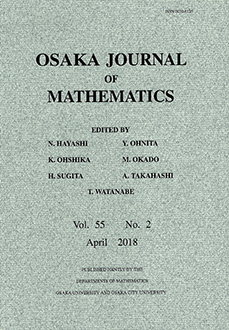Abstract
We study the large time asymptotic behavior of solutions to the Cauchy problem for the fractional nonlinear Schrödinger equation \begin{equation*}\left\{ \begin{array}{c}i\partial _{t}u-\frac{1}{\alpha }\left\vert \partial _{x}\right\vert^{\alpha }u=\lambda \left\vert u\right\vert ^{\alpha }u,\text{ }t\gt 0,\text{ } x\in \mathbb{R}\mathbf{,} \ u\left( 0,x\right) =u_{0}\left( x\right) ,\text{ }x\in \mathbb{R}\mathbf{,}\end{array}\right.\end{equation*}where $\lambda \gt 0,$ the fractional derivative $\left\vert \partial_{x}\right\vert ^{\alpha }=\mathcal{F}^{-1}\left\vert \xi \right\vert^{\alpha }\mathcal{F},$ $\alpha \gt \frac{5}{2}.$ This paper is a sequel to our previous papers [17] for $2\lt \alpha \lt \frac{5}{2}$ and [36] for $\alpha =\frac{5}{2}$. We show that solutions decay in time at the rate $t^{-\frac{1}{\alpha }}\left( \log t\right) ^{-\frac{1}{\alpha }}$, namely that the nonlinearity acts as a dissipative term, when $\lambda \gt 0$. This phenomena does not occur for the cubic problem \begin{equation*}\left\{ \begin{array}{c}i\partial _{t}u-\frac{1}{\alpha }\left\vert \partial _{x}\right\vert^{\alpha }u=\lambda \left\vert u\right\vert ^{2}u,\text{ }t\gt 0,\text{ }x\in \mathbb{R}\mathbf{,} \ u\left( 0,x\right) =u_{0}\left( x\right) ,\text{ }x\in \mathbb{R}\mathbf{,}\end{array}\right.\end{equation*}with $0 \lt \alpha \leq 2.$
Acknowledgments
We would like to thank the referee for useful suggestions on the draft. The work of N.H. is partially supported by JSPS KAKENHI Grant Numbers JP20K03680, JP19H05597. The work of P.I.N. is partially supported by CONACYT and PAPIIT project IN103221.
Citation
Nakao Hayashi. Naumkin Pavel I.. Isahi Sánchez-suárez. "Asymptotics of solutions to the fractional nonlinear Schrödinger equation with $\alpha \gt \frac{5}{2}$." Osaka J. Math. 61 (2) 163 - 193, April 2024.
Information





